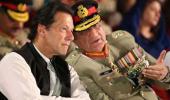The ISI was taking no chances and wanted no repeat of Pulwama; it wanted to make it clear at a political level it was not involved with the revenge attack being planned, but was only giving India a friendly tip-off.
A stunning excerpt from Ambassador Ajay Bisaria's Anger Management: The Troubled Diplomatic Relationship between India and Pakistan.

A few days later in June, I received a phone call in Islamabad at two in the morning. My caller was a contact close to the ISI and I assumed he was calling me simply because he was up late like most folks in Islamabad awaiting the sehri meal in the month of Ramzan.
The call had a more serious purpose, it was to tip me off with a specific input about al-Qaeda planning an attack in Kashmir.
On 23 May, a terrorist, Zakir Musa, had been killed in the town of Tral in Kashmir's Pulwama district. Al-Qaeda was apparently about to avenge Musa's killing.
I asked if this information had been conveyed through the normal military channels, the DGMO hotline. I was told it might have been, but that the ISI leadership was keen to escalate the information to my level so that I could convey this to India.
At this point Asim Munir was the DG of the ISI. I passed on this information to India, concerned this was some kind of game.
It turned out that this was a genuine enough tip-off when an attack was indeed attempted close to the predicted time and place.
This was an unusual input that Pakistan seemed to be giving to India.
One theory about why the high commission was used as a channel was that the ISI was taking no chances and wanted no repeat of Pulwama; it wanted to make it clear at a political level it was not involved with the revenge attack being planned, but was only giving India a friendly tip-off with a piece of intercepted intelligence.
Another surmise was that General Bajwa, the army chief, through the ISI, was trying to improve the atmospherics in the relationship in the run-up to the Bishkek summit of 14 June, hoping that Pakistan's sincerity about trying to better relations would register on the Indian side.
Perhaps coincidentally, a day before the attack, the ISI chief, Asim Munir, lost his job.
Munir was replaced overnight as DG of the ISI by Faiz Hameed, a three-star general who had been famously named by Nawaz Sharif as the army man who was responsible for giving cash to TLP militants during an anti-blasphemy protest, the Faislabad sit-in.
He was someone Bajwa appeared to trust, and Imran Khan was familiar with, as the political fixer within the ISI. Hameed's forte was political manipulation within, rather than strategic games with neighbours.

Rumours were afloat of an angry moment with Imran Khan insisting that Munir, who had been appointed spy chief on Khan's watch only eight months earlier, should be removed that very day.
Bajwa, whose extension file needed to be signed by Khan, reluctantly agreed to humour the angry PM.
Talk began in Islamabad's gossip circles of a litany of lapses by the short-lived departing DG -- he had not shared information on Pulwama; not warned his bosses about Balakot; had goofed up on a few domestic political operations, like a hatchet job against Justice Qazi Faez Isa, an upright Balochi judge who was challenging the writ of the army and would later become Pakistan's chief justice.
When I asked my interlocutor if the change had anything to do with India and Pulwama, he flatly denied this theory and told me it was a sensitive internal matter and he could not share details of that time, but 'Khan Munir se bahut gussa hua (Imran Khan was mad at Munir)'.
The real reason for Munir's axing would only tumble out into the public domain in 2022. Asim Munir, the revelation went, had dared put the scope on First Lady Bushra Begum and warned PM Imran Khan about corruption in his household.
Imran Khan's friend, Naeemul Haque, invited me to his home late one night in June 2019 to share some thoughts after India's elections.
Despite his battle with cancer and continuing chemotherapy, Haque at that point was deeply involved in the Pak-Afghan relationship.
Haque felt the 'Afghan model' of Khan's diplomacy could be applied to India -- Khan's short meeting with President Ghani in Mecca on 1 June on the sidelines of an OIC meeting had gone off well.
Haque was convinced that his friend could have a similar meeting with Modi and convince him of his sincerity. He would be willing to give some persuasive answers to the Indians on the question of terrorism and how he intended to stamp it out in Pakistan.

The opportunity would present itself in a few days in Bishkek on 14 June and all it required was a brief handshake and conversation.
Khan would be happy to spend just five or ten minutes with Modi in a one-on-one meeting -- that's all it would take to persuade the Indian prime minister of his sincerity.
He would hope to get a positive response to starting a dialogue that could perhaps kick off with a meeting of the foreign secretaries but should be rapidly escalated to a personal structured meeting between the political leaders.
If the Indian prime minister chose to discuss the issue of 'violent extremism', Khan could give a reassuring response on Pakistan's action so far and its vision of the future. This could open doors for flights, trade, transit.
Haque also believed that we could move towards opening our consulates in Mumbai and Karachi; he felt Pakistan should not insist on getting back Jinnah House.
Haque's optimism was infectious, as much as his faith in Khan's abilities was touching. I said that I would pass on these ideas to Delhi, but this was a meeting perhaps too soon after Pulwama-Balakot and much too soon after Indian elections for us to hope for a breakthrough.
We might perhaps need to wait for decisions on the spot in Bishkek on the nature of the meeting and whether it could go beyond the courtesies.
Most importantly, India had not been convinced that elements in the Pakistani system would not try to sabotage any fresh peace initiative with a new terror initiative.
Excerpted from Anger Management: The Troubled Diplomatic Relationship between India and Pakistan by Ajay Bisaria, with the kind permission of the publishers, Aleph Book Company.
Feature Presentation: Aslam Hunani/Rediff.com










